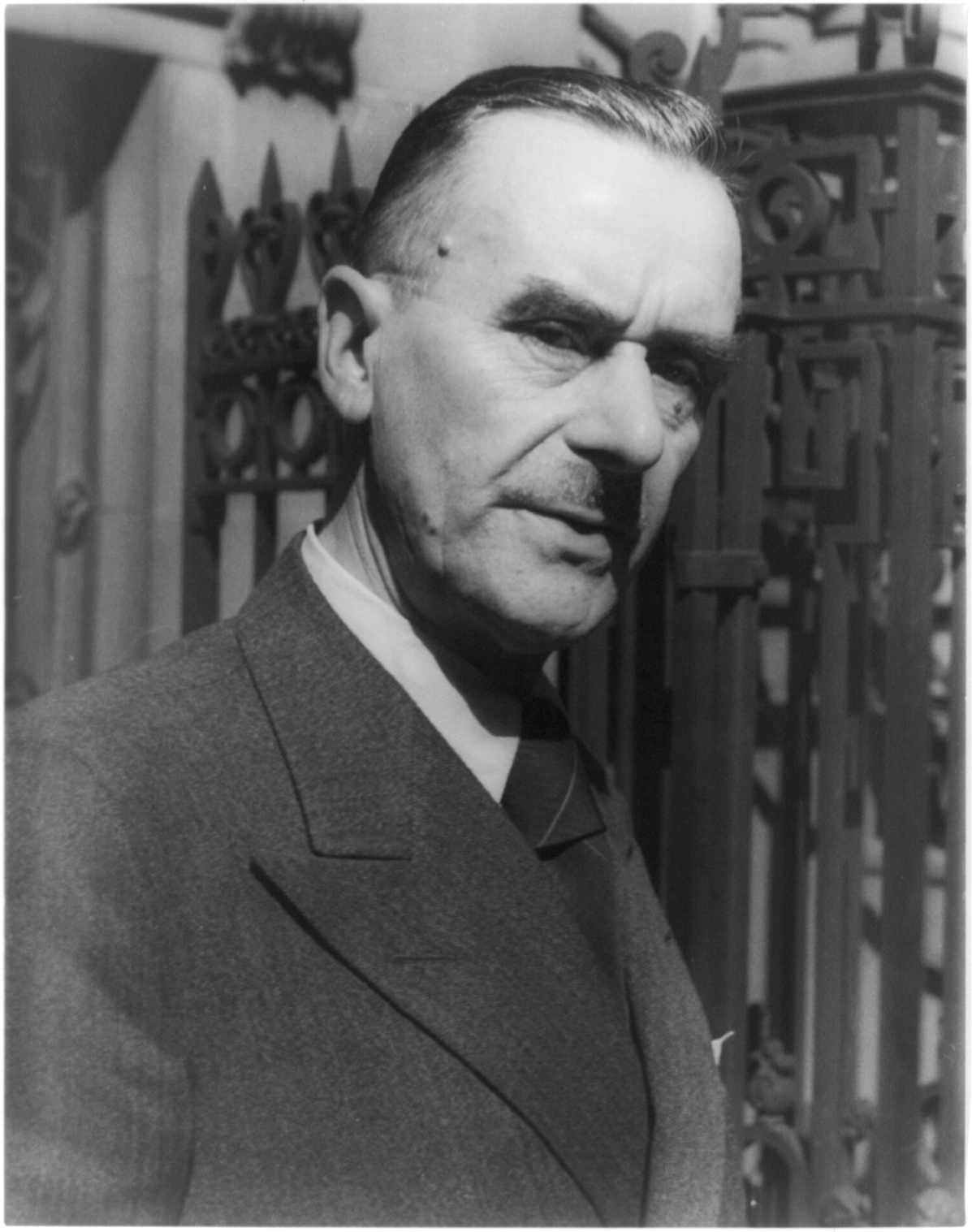Death in Venice
Frases célebres de Thomas Mann
“La tolerancia es un crimen cuando lo que se tolera es la maldad.”
Fuente: María V. C. Frases inspiradoras: Lo único imposible es aquello que no intentas. Editorial Grupo Fénix CR, 2017. p. 83.
“Pensad como hombres de acción, actuad como hombres pensantes.”
Fuente: Herrera Carles, Humberto. 1500 Frases, pensamientos para la vida. Editor Lulu.com. ISBN 9781105216565. p. 47.
“La guerra es la salida más cobarde de los problemas de la paz.”
Fuente: Citado en Martín Pascual, Gerardo. En el corazón de otros tiempos. Editorial Visión Libros. ISBN 9788499832821. p. 181.
Frases de hombres de Thomas Mann
Los orígenes del «Doktor Faustus»
La muerte en Venecia / Mario y el mago
Frases de mundo de Thomas Mann
Confessions of Felix Krull, Confidence Man: The Early Years
“¿Por qué todo el mundo que quiere migrar o buscar un trabajo se dirige a mí?”
Los orígenes del «Doktor Faustus»
Death in Venice
Thomas Mann Frases y Citas
The Magic Mountain
Death in Venice
Variante: La soledad hace madurar lo original, lo audaz e inquietamente bello, el poema. Pero también engendra lo erróneo, desproporcionado, absurdo e ilícito.
La montaña mágica
La montaña mágica
“El que nace para ser ahorcado nunca morirá ahogado.”
Fuente: Ortega Blake, Arturo. El gran libro de las frases célebres. Editorial Penguin Random House Grupo Editorial México, 2013 ISBN 978-60-7311-631-2.
Fuente: Citado en Zuleta, Estanislao. Thomas Mann, La montaña mágica y la llanura prosaica. 2ª Edición. Hombre Nuevo Editores, 2003. p. 309.
“La belleza, como el dolor, hace sufrir.”
Fuente: Israel, Ricardo. El libro de las verdades. Citas citables. Editorial RIL Editores, 2011. p. 12.
“El escritor es aquel al que escribir le resulta más difícil que a las demás personas.”
Fuente: Citado en Marina, José Antonio. La magia de escribir. Editorial Penguin Random House Grupo Editorial España, 2010. ISBN 9788401390456.
Fuente: Citado en Becerra, David. La Guerra Civil como moda literaria. Editorial Clave Intelectual, 2016. ISBN 9788494528149. p. 1897.
Fuente: Domenico Losurdo en Stalin: historia y crítica de una leyenda negra, p. 17.
Confesiones del estafador Félix Krull
“la palabra es enemiga de lo misterioso y cruel delatora de lo vulgar.”
Confesiones del estafador Félix Krull
La muerte en venecia/Las tablas de la ley
La montaña mágica
Death in Venice
“Quien toma en serio a Nietzsche, quien lo toma al pie de la letra y le cree, está perdido.”
Fuente: Citado en Sebreli, Juan José. El olvido de la razón. Editorial Penguin Random House Grupo Editorial Argentina, 2011. ISBN 9789500734769.
Thomas Mann: Frases en inglés
Fuente: Death in Venice (1912), Ch. 2, as translated by David Luke
“This longing for the bliss of the commonplace.”
Fuente: Tonio Kröger (1903), Ch. 4, and also in Ch. 9, as translated by David Luke
“It is a cruel atmosphere down there, cruel and ruthless.”
Hans Castorp on the world outside the sanatorium, in Ch. 5
The Magic Mountain (1924)
The Coming Victory of Democracy (1938), p. 14, translated by Agnes E. Meyer, Knopf (1938)
Suffering and Greatness of Richard Wagner (1933)
“I, for one, have never in my life come across a perfectly healthy human being.”
The psychoanalyst "Dr. Krokowski" in Ch. 1
The Magic Mountain (1924)
“Opinions cannot survive if one has no chance to fight for them.”
Fuente: The Magic Mountain (1924), Ch. 6
“If you are possessed by an idea, you find it expressed everywhere, you even smell it.”
Variant translation: It is strange. If an idea gains control of you, you will find it expressed everywhere, you will actually smell it in the wind.
As translated by Bayard Quincy Morgan
Tonio Kröger (1903)
Reflections of a Non-Political Man http://germanhistorydocs.ghi-dc.org/sub_document.cfm?document_id=946 [Betrachtungen eines Unpolitischen] (1918)
Suffering and Greatness of Richard Wagner (1933)
"Tonio Kröger" on general opinions about artists.
Tonio Kröger (1903)
“What a glorious gift is imagination, and what satisfaction it affords!”
Bk. 1, Ch. 2
Confessions of Felix Krull, Confidence Man (1954)
Madame Houpflé, Bk. 2, Ch. 9
Confessions of Felix Krull, Confidence Man (1954)
Fuente: Death in Venice (1912), Ch. 2, as translated by David Luke
Fuente: Death in Venice (1912), Ch. 5, as translated by David Luke
Fuente: The Magic Mountain (1924), Ch. 6; variant translation: I will let death have no mastery over my thoughts! For therein, and in nothing else, lies goodness and love of humankind.
Fuente: Death in Venice (1912), Ch. 3, as translated by David Luke
“Latin phrase meaning "It pleases to experiment", Ch. 4”
Placet experiri
The Magic Mountain (1924)
Cited in Awake! magazine, 1995, 8/22; article: The Evils of Nazism Exposed.
In 1933, The Golden Age carried the first of many reports of the existence of concentration camps in Germany. In 1938, Jehovah’s Witnesses published the book Crusade Against Christianity, in French, German, and Polish. It carefully documented the vicious Nazi attacks on the Witnesses and included diagrams of the Sachsenhausen and Esterwegen concentration camps.
“My aversion from music rests on political grounds.”
Fuente: The Magic Mountain (1924), Ch. 4
“Psycho-analyses — how disgusting.”
"Hans Castorp" in Ch. 1
The Magic Mountain (1924)
“Extraordinary creature! So close a friend, and yet so remote.”
Herr und Hund (A Man and his Dog) (1918)
Speech at the US Library of Congress (29 May 1945); published as "Germany and the Germans" ["Deutschland und die Deutschen"] in Die Neue Rundschau [Stockholm] (October 1945), p. 58, as translated by Helen T. Lowe-Porter
Quoted in Survey of Contemporary Literature (1977) by Frank Northen Magill, p. 4263
“But he would “stay the course” — it was his favorite motto.”
The disposition of the main character "Gustav Aschenbach", Ch. 2, as translated by David Luke
Death in Venice (1912)
